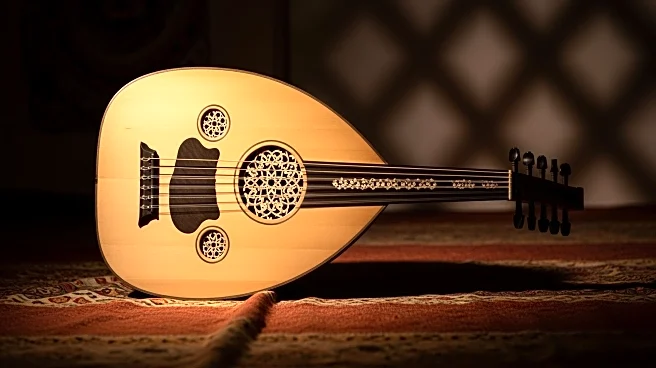What's Happening?
Clarissa Bitar, a Palestinian musician raised in Los Angeles, has released a new album titled 'Bakhaf al-Layl.' The album features the oud, a traditional Middle Eastern string instrument, which Bitar has been
drawn to since childhood. The oud used in the album is over 100 years old, crafted in 1921, and is noted for its intricate design. Bitar's new work marks a significant shift as they incorporate their own vocals for the first time, a decision influenced by their personal journey and transition. The album's title track, 'Bakhaf al-Layl,' translates to 'I fear the night,' reflecting themes of longing and emotional depth.
Why It's Important?
Bitar's album represents a cultural bridge, bringing traditional Middle Eastern music to a broader audience. By incorporating personal experiences and transitions into their music, Bitar offers a unique perspective that resonates with themes of identity and belonging. This release is significant in the context of preserving cultural heritage, especially amid ongoing challenges faced by Palestinians. The album not only showcases the oud's rich history but also highlights the evolving nature of cultural expression through music. Bitar's decision to include their vocals after transitioning adds a layer of authenticity and personal growth, potentially inspiring others in similar journeys.
What's Next?
As Bitar's album gains attention, it may lead to increased interest in Middle Eastern music and instruments like the oud. This could foster greater cultural appreciation and understanding. Bitar's work might also encourage other artists to explore and integrate traditional instruments into contemporary music. Additionally, the album's themes of longing and identity could spark discussions on cultural preservation and personal expression in the arts. Bitar may continue to perform and promote their album, potentially leading to collaborations with other artists and further exploration of their musical style.
Beyond the Headlines
Bitar's album release comes at a time when cultural preservation is crucial, especially for communities facing displacement and loss. The oud, as a symbol of Middle Eastern heritage, serves as a reminder of the region's rich musical history. Bitar's personal journey and transition, reflected in their music, highlight broader societal themes of acceptance and identity. This development underscores the role of music as a powerful medium for storytelling and cultural connection, offering a platform for marginalized voices to be heard and appreciated.










